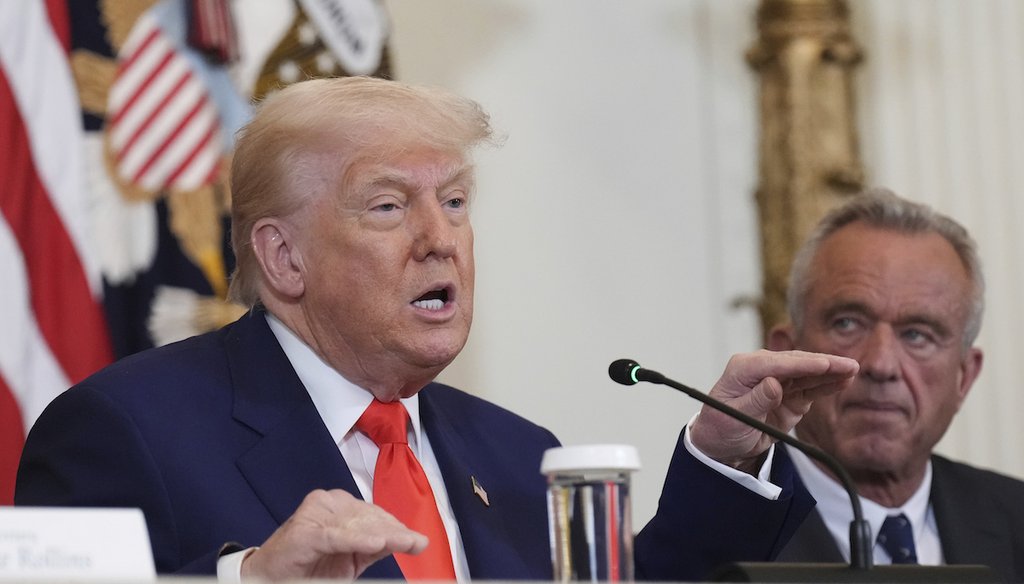Get PolitiFact in your inbox.
RFK Jr.’s childhood health report addresses vaccines, obesity and autism

President Donald Trump, left, speaks as Health and Human Services Secretary Robert F. Kennedy Jr. listens during a Make America Healthy Again (MAHA) Commission Event in the East Room of the White House, May 22, 2025, in Washington.
U.S. Health and Human Services Secretary Robert F. Kennedy Jr. unveiled his first Make America Healthy Again commission report, which calls on the federal government to confront the root causes of childhood chronic disease. The report focuses on vaccines, processed foods, obesity and autism — issues that Kennedy has long discussed.
"Today's children are the sickest generation in American history in terms of chronic disease and these preventable trends continue to worsen each year, posing a threat to our nation's health, economy, and military readiness," the May 22 report states.
The 72-page report stems from President Donald Trump's campaign promise to create "a special presidential commission to investigate what is causing the decades-long increase in childhood diseases, autoimmune disorders, autism, obesity, infertility and other chronic health problems." It's one of 75 Trump campaign promises on the MAGA-Meter, which PolitiFact uses to periodically evaluate the administration's progress on Trump's 2024 campaign promises, just as we did with Barack Obama, Trump during his first term and Joe Biden.
Kennedy described the report as a product of historic government "consensus," but the response from health experts was more diverse. Many health experts agreed with points in the report, including that Americans are eating too many ultra-processed foods, while criticizing other aspects of Kennedy's messaging.
William Schaffner, an infectious disease professor at the Vanderbilt University School of Medicine, said the U.S. has had an increase in diabetes and obesity. However, he disputed that today's children are the "sickest generation."
"Our life expectancy at birth has been increasing steadily over time," Schaffner said.
Marion Nestle, a retired New York University professor of nutrition, food studies and public health, called the report "a devastating picture of what our society has done to kids."
"It's a call to action, and a loud and powerful call to take on the food, drug, chemical, and other industries," Nestle said.
But healthy eating is only a piece of the puzzle, wrote Miranda Yaver, assistant professor of health policy and management at the University of Pittsburgh. Millions of Americans live in "food deserts," which means they lack access to nearby supermarkets and affordable produce.
The report says that the majority of medical costs are related to chronic diseases. A critical way to manage disease is through health care, Yaver wrote. But the report's release coincided with House Republicans' passage of Trump-backed legislation that is expected to push at least 8.6 million people off of their insurance, according to the Congressional Budget Office.
On vaccines, the report touts their benefit for children "by protecting them from infectious diseases." Kennedy, who has made false and misleading statements about vaccines, announced May 27 that the federal government would no longer recommend COVID-19 vaccines for healthy children or healthy pregnant women.
The report is correct about an increase in autism rates but ignores explanations for the increase. The autism criteria shifted in 2013 when three diagnoses — autistic disorder; Asperger's syndrome; and pervasive developmental disorder, not otherwise specified — were merged into a singular autism spectrum disorder diagnosis.
Kennedy had set a self-imposed deadline of September to find the cause of autism, but he recently pushed it back.
"We'll have some of the information (by September). To get the most solid information, it will probably take us another six months," Kennedy said May 22 on CNN. By the end of those additional six months, "I expect we will know the answers of the etiology of autism."
The report is also notable for what it doesn't address, including gun violence, which particularly affects teenagers. It also makes scant mention of substance abuse.
In August, the presidential task force plans to submit a strategy to restructure the government's response to childhood chronic disease, the report said.
"Until then, it's hard to know what they actually intend to do," Nestle said.
We will check in on the commission's progress at that time, but for now we rate this promise In the Works.
RELATED: HHS Secretary RFK Jr. tussled with Sen. Chris Murphy about measles vaccine safety. Who was right?
Our Sources
Trump administration, The MAHA report, May 22, 2025
KFF Health News Morning briefing, RFK Jr.'s MAHA Commission Draws Dark Picture Of Kids' Health In Report, May 22, 2025
Miranda Yaver, assistant professor of Health Policy and Management at the University of Pittsburgh. The MAHA Commission's Hot Mess, May 22, 2025
CNN, Kennedy pushes autism study deadline, calls on farmers to support MAHA agenda, May 22, 2025
Washington Post, The findings — and scientific problems — in White House 'MAHA Report' May 22, 2025
Email interview, Marion Nestle, retired nutrition, food studies, and public health, at New York University, May 23, 2025
Email interview, William Schaffner, an infectious disease professor at the Vanderbilt University School of Medicine, May 23, 2025
